FOCUS ON UK SUPPORT
UK Minister for Europe Leo Docherty says the UK will “stand by Georgia for the long term” PAGE 2
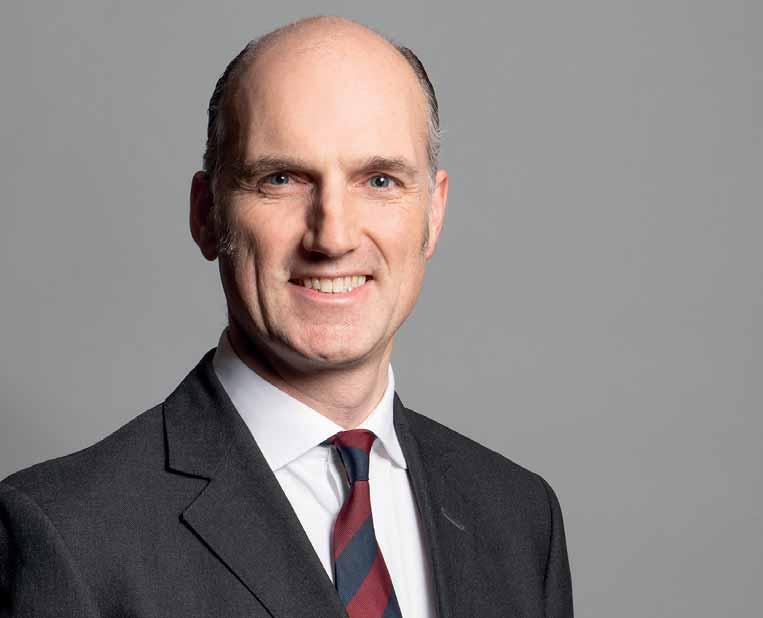
In this week’s issue...
Embassy of the United Arab Emirates in Tbilisi Held Charity Event in Cooperation with the Emirates Red Crescent
NEWS PAGE 2
Yermolenko: From Pushkin to Putin
POLITICS PAGE 6
Significance of the Middle Corridor - Underestimation Is Unacceptable and Overestimation Is Impossible. Part 2
BUSINESS PAGE 8
Carrefour Freezes the Prices of 1,000 Products
BUSINESS PAGE 9
EC Says Future of Ukraine, Moldova, Georgia Lies within EU
The European Council on Monday published conclusions on EU priorities for cooperation with the Council of Europe in 2023-2024.
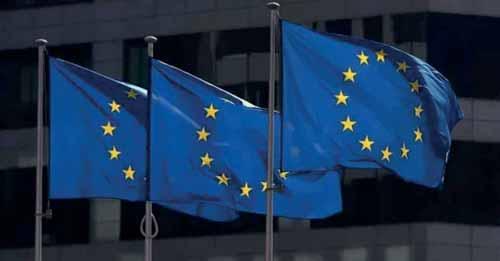
According to the statement, the prospect of EU membership represents a significant factor for stability in Europe, which the Council of Europe continues to reinforce.
“On 23 June 2022, the European Council recognized the European perspective of Ukraine, the Republic of Moldova and Georgia. The future of these countries and their citizens lies within the European Union. This gives a renewed impetus to making further progress on human rights, democracy and the rule of law in these countries and in the wider region,” reads the statement.
It went on to say that the EU acknowledges the Council of Europe’s important role in supporting the alignment with European Standards and strengthening the capacity building of important institutions during the reform processes in the Western Balkans and the Eastern Partnership countries.
“The EU and the Council of Europe will continue working together to help candidate countries and potential candidates for EU accession make tangible progress in their overall reform process towards meeting the EU’s membership
criteria. Our joint programs in the Enlargement and Neighborhood regions will continue to support reform efforts in the fields of human rights, democracy and the rule of law,” reads the statement.
The Plant Based Treaty and Georgia’s Growing Team of Vegan Activists


SOCIETY PAGE 9
Ukrainian Sweets - Something Homely Away from Home
SOCIETY PAGE 10
Where I’ve Never Been
CULTURE PAGE 11
Issue no: 1384 • • FEBRUARY 3 - 9, 2023 • • PUBLISHED WEEKLY
PRICE: GEL 2.50
Markets of BONDSPricew/wm/mSTOCKSPricew/wm/m GRAIL 07/2888.46 (YTM 6.58%) +0,0%+0,7% Bank of Georgia (BGEO LN)GBP 26.85 +3,1%+3,1% GEBGG 07/23100.23 (YTM 5.50%) 0,3% 0,2% Georgia Capital (CGEO LN)GBP 7.36 1,6% +0,8% GEOCAP 03/2496.70 (YTM 9.32%) +0,2%+1,6% TBC Bank Group (TBCG LN)GBP 23.80 +6,5%+4,8% SILNET 01/2798.32 (YTM 8.89%) +0,1%+3,8% TBC 06/2498.53 (YTM 6.88%) +0,2%+0,2% CURRENCIESPricew/wm/m GEL / USD2,6424 0,1% 2,1% GEL / EUR2,8672 0,3% 0,8% COMMODITIESPricew/wm/m GEL / GBP3,2620 0,4% 0,0% Crude Oil, Brent (US$/bbl)84,90 3,7% 1,2% GEL / CHF2,8560 0,4% 2,1% Gold Spot (US$/OZ)1 923,17 0,4% +5,4% GEL / RUB0,0377 1,8% +3,6% GEL / TRY0,1405 0,1% 2,6% INDICESPricew/wm/m GEL / AZN1,5546 0,3% 2,1% FTSE 1007 784,87 +0,0%+4,5% GEL / AMD0,0067 0,2% 2,5% FTSE 25019 937,20 +0,7%+5,8% GEL / UAH0,0717 1,9% DAX15 126,08 +0,2%+8,6% EUR / USD0,9216 +0,2% 1,3% DOW JONES33 717,09 +0,3%+1,7% GBP / USD0,8096 +0,2% 2,2% NASDAQ11 393,81 +0,3%+8,9% CHF USD0,9249 +0,3%+0,0% MSCI EM EE34,21 0,6% +8,6% RUB / USD70,1256 +1,8% 5,5% MSCI EM1 044,00 +0,5%+9,2% TRY / USD18,7908 0,1% +0,4% SP 5004 017,77 0,1% +4,6% AZN / USD1,6966 0,0% MSCI FM2 225,41 0,8% +6,1% AMD USD395,3000 0,1% +0,3%
PreparedforGeorgiaTodayBusinessby
UK Minister for Europe, Leo Docherty
Ukraine Latest: Kyiv Signals Reforms ahead of EU Summit
COMPILED BY ANA DUMBADZE
Ukraine’s President Volodymyr Zelensky said Tuesday that Kyiv is preparing new reforms as it gears up for a summit with top EU officials at the end of the week.
In his nightly address, Zelensky said the reforms “will change the social, legal and political reality in many ways, making it more human, transparent and effective. But these details will be announced later,” he added.
Ukraine will host European Commission President Ursula von der Leyen and other top EU officials on Friday, with hopes high in Kyiv that its application to join the EU will progress quickly.
Embassy of the United Arab Emirates in Tbilisi Held Charity Event in Cooperation with the Emirates Red Crescent
On January 26, the Embassy of the United Arab Emirates in Georgia, in cooperation with the Red Crescent Organization of the Emirates, held another charity event. Within the framework of charity, 200 food boxes and warm winter clothes were distributed to the beneficiaries of the Muslim Administration of All Georgia, the Patriarchate of Georgia and the Agency of State Care.
The head of the consular department of the United Arab Emirates, Mr. Khaled Alkaabi, personally handed over the charity products to the beneficiaries.
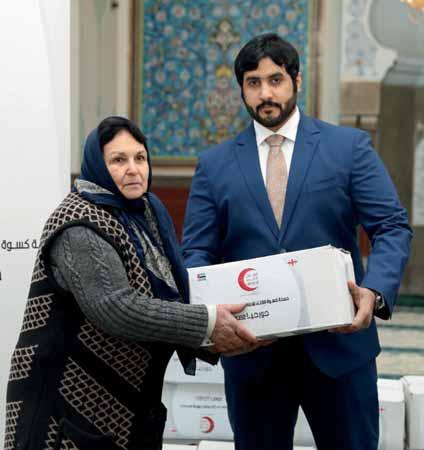
Mr. Alkaabi expressed gratitude towards the Muslim Administration of All Georgia, the Patriarchate of Georgia and the Agency of State Care for giving the Embassy the opportunity and for providing assistance in order to reach out to families in need within the framework of the charity. He also expressed the readiness to corporate further.
The Emirates Red Crescent has been the leading humanitarian organization in the United Arab Emirates since 1983 and is constantly striving to support friendly countries and help people in need, regardless of ethnicity, religion, or geography.
In other news, US President Joe Biden told reporters he is planning to speak to President Zelensky about future military aid packages amid reports that further assistance could be announced as early as this week.
“We’re going to talk,” Biden said when asked if he has spoken to Zelensky and what he planned to tell him about future assistance requests.
Two US officials briefed on the matter told Reuters Tuesday that the US is preparing to offer Kyiv a $2.2 billion military aid package which is expected to include longer-range rockets for the first time, as well as other munitions and weapons.
Ukraine’s Prosecutor General Andriy Kostin said Wednesday that regional authorities have registered more than 65,000 Russian war crimes since Moscow’s conflict began nearly a year ago.
“We have all witnessed with horror the evidence of atrocities committed in Bucha, Irpin, Mariupol, Izium, Kherson, Kharkiv regions and other liberated cities and towns,” Kostin said, noting the discoveries of mass burial sites in areas occupied by Russian troops.
“These crimes are not incidental or accidental, they include indiscriminate shelling of civilians, willful killing, torture, conflict-related sexual violence,
looting and forced displacement on a massive scale,” he added in remarks at the Georgetown Law School in Washington.
His comments add to an emerging picture of the horrors experienced during nearly a year of war in Ukraine. The conflict has shown few signs of ending soon, even as local and international officials try to probe potential crimes committed over recent months in Ukraine.
In a separate discussion with journalists, Kostin said he believed Kyiv was close to gaining US support to establish a special tribunal to prosecute Russia’s crimes of aggression.
FIVE SHIPS LEAVE UKRAINIAN PORTS UNDER BLACK SEA GRAIN INITIATIVE
Five vessels carrying 216,719 metric tons of grain and other food products have left Ukrainian ports, the organization overseeing the export of agricultural products from the country said.
The vessels, carrying wheat and corn, are destined for Spain, Turkey, Portugal, Egypt and China.
The Black Sea Grain Initiative, a deal brokered in July between Ukraine, Russia, Turkey and the United Nations, eased Russia’s naval blockade and saw three key Ukrainian ports reopen.
So far, more than 690 ships have sailed from Ukrainian ports.
US SANCTIONS 22 IN GLOBAL NETWORK SUPPORTING RUSSIA’S MILITARY
The US Treasury Department announced fresh sanctions against a multinational group of 22 individuals and entities supporting Russia’s military-industrial complex.
The sanctions target the “Zimenkov network”, a Russian sanctions evasion network led by Igor Vladimirovich Zimenkov, an arms dealer based in Russia and Cyprus. The group has worked to supply a Russian company with hightechnology devices for use in its war against Ukraine and supported previ-
ously sanctioned entities in Russia. The Zimenkov network has also reached as far as Singapore, Belarus, Bulgaria and Israel. The sanctions block access to all property and interests of the sanctioned individuals and entities owned or in possession of an American on US soil.
BORIS JOHNSON CALLS ON WEST TO SEND FIGHTER JETS TO UKRAINE ‘AS FAST AS POSSIBLE’
Former UK Prime Minister Boris Johnson is calling on Western allies to give Ukraine fighter jets and whatever else it needs to combat Russia.
“All I will say is that every time we have said it will be a mistake to give such and such an item of weaponry, we end up doing it and it ends up being the right thing for Ukraine,” Johnson said during an interview with Fox News. The former PM spoke while on a trip to Washington to rally support for Ukraine among members of Congress.
The US and UK recently shot down the idea of sending Western F-16 fighter jets to Ukraine, something Kyiv has long been asking for.
“We do not think it is practical to send those jets into Ukraine,” a Downing Street spokesperson said on Tuesday.
Aside from the massive amount of training it would require, many Western leaders also fear that sending such sophisticated and powerful equipment to Ukraine would provoke Russia too much. But Johnson rejected the notion, saying that was the same mindset that preceded many prior decisions to ultimately send other advanced weapons to Ukraine.
“I remember being told it was the wrong idea to give them the anti-tank shoulderlaunched missiles. Actually, they were indispensable and the United States, under Donald Trump, gave them the Javelins as well. They were indispensable in the battles to repel the Russian tanks,” he said.
“All I’m saying is save time, save money, save lives. Give the Ukrainians what they need as fast as possible,” Johnson said.
UK Reiterates Commitment to the Security and Stability of Georgia as the Country Faces Increasing Russian Aggression
ued collaboration on international sanctions, and supporting Georgia's aspirations for closer ties with NATO through the Tailored Support Package.
Radio Free Europe’s Georgian Service spoke to UK Minister for Europe Leo Docherty after the meeting.
LET’S START WITH THE IMPORTANCE AND IMPACT OF THE WARDROP DIALOGUE. WHAT HAS BEEN ACHIEVED?
Let me begin by saying that because of the remarkable change of security contexts in the region, this meeting was particularly important. Georgia knows more than any other country about what it's like to suffer a Russian invasion.
UKRAINE WHEN IT COMES TO MILITARY ASSISTANCE?
- ANYTHING IN PARTICULAR IN STORE?
FOR
DECADES NOW.
INTERVIEW BY VAZHA TAVBERIDZE
Known as the ‘Wardrop Dialogue’, UK Foreign Secretary James Cleverly hosted Georgia’s Foreign Minister Ilia Darchiashvili at Lancaster House in London on 26 January for the 8th annual UK-Georgia Strategic Dialogue. Minister Darchiashvili was told that the UK would “stand by Georgia for the long term.”
During the meeting, the ministers agreed to increase cooperation on a range of priorities, including combatting Putin’s aggression through contin-
From our perspective, Georgia has a really important role in regional stability in the Caucasus, and we want to help them on their journey to develop as a nation. We really appreciate their EuroAtlantic journey, and so it was a useful day to discuss all of that and to map out our deeper cooperation in the future. Cooperation in defense and security is very important, as in energy, because Georgia is a really important country through which a great deal of energy supply transmits.
CONCERNING THE CHANGING SECURITY ENVIRONMENT - AS A FORMER MILITARY AND NOW MINISTER OF EUROPE,
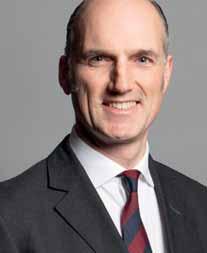
THERE IS

This has been a big week actually. We've seen a remarkable step up in provision. And I think what we'll be interested to see is exactly how quickly that translates into fighting power on the side of the Ukrainians. But I think that's a very strong message as to the European and US collective resolve. There may be other things, but I think they'll be considered when the Ukrainians request them - we will always consider any requests from our Ukrainian friends. There are also logistic constraints as to what is best suited to the Ukrainian requirements. We have to wait now and see how they how they get on with this very significant increase in military support this year.
PERHAPS RE-ARMING AND STRENGTHENING OTHER COUNTRIES IN THE REGION WHO ARE POTENTIALLY UNDER THREAT FROM MOSCOW SHOULD ALSO BE THE ORDER OF THE DAY?
You're absolutely right. There’s a massive regional impact, and we are doing everything we can with countries neighboring Ukraine to build their resilience. The entire security architecture of eastern central Europe has changed fundamentally. And this will be a change that lasts for a very long time.
WHAT ABOUT GEORGIA
Talking in broad terms, it's very true to say that the necessity of having strong Georgian institutions, including a strong and strengthening military, is very important. And I think the trend of empowering nations in Eastern Europe and in the Black Sea and the Caucasus; having strong militaries, but also open economies, free societies and vibrant press; being members of the free market world, is crucial. What was really instructive about the last year was the failure of the autocratic model. Many commentators predicted prior to February 24 that Putin's military would steamroll across Ukraine; would occupy and defeat the Ukrainian nation in very short order. Exactly the reverse happened. And that really demonstrates the failure of autocracy in the sense that anyone who thought that Putin’s military was effective, because he was an autocrat and wasn't being held to account by a parliament, has been proved wrong.
IN GEORGIA, IN THE ABSENCE OF A NATO UMBRELLA, THERE IS ALWAYS A QUESTION HANGING OVER THE COUNTRY'S FUTURE. AFTER THE WAR IN UKRAINE, KYIV MAY BE WELCOMED INTO NATO. WOULD ANY CONSIDERATION BE GIVEN TO GEORGIA’S SIMILAR ASPIRATIONS? AFTER ALL, IT'S BEEN KNOCKING ON NATO’S OPEN DOOR
In the long term, anything's possible. In the last year, we've seen the failure of Putin's calculation. He thought by claiming that NATO was being aggressive and provocative, he would end up with less of a NATO presence on his doorstep. Well, it's quite the reverse, and he's probably going to end up with more NATO. What he's done is to unify and strengthen the resolve of NATO in a way that, frankly, was unthinkable, because he's forced all NATO members through this crisis to actually face up to the need for hard power, and a much greater investment in military capability, in a way that was completely impossible before the war. So it’s a massive irony, a huge paradox: He's brought about by his own actions and his own personal decisions, the very circumstance he claims to be acting against.
HAS PUTIN’S
INVASION OF UKRAINE MADE GEORGIA'S NATO MEMBERSHIP PROSPECTS MORE OR LESS LIKELY?
In the very long term, probably more likely. Because if you look at countries like Armenia, or Serbia, any country that thought that having a very deep security defense relationship with Russia was a good thing, has been proved wrong. And all of these countries that were formerly very deep Russian allies, Putin’s allies, are now looking around for alternatives. So let's see what happens.
GEORGIA TODAY FEBRUARY 3 9, 2023 2 NEWS
YOU THINK
MORE EUROPE COULD DO FOR
DO
UK Minister for Europe, Leo Docherty
POLITICS
“Back in the USSR, You Don't Know How Lucky You Are…”
a renewed vigor forward, leading members of the government lashed out. The ruling party Georgian Dream characterized the decision as purely political, despite the EU report citing clear violations in media freedom, fair and secure investigations, and the destructive actions of an oligarchy.
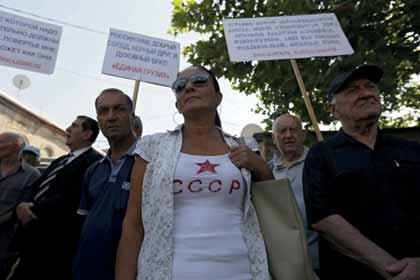
The decision by the EU sparked protests in the capital, with tens of thousands rallying in front of the Parliament building calling for action. But instead of protesting the decision itself, it was the stubborn resistance from the ruling party that led these groups to demonstrate. The leaders of these protestors, mirroring some of the statements by EU officials, point the finger at former Prime Minister of Georgia Bidzina Ivanishvili.
in cahoots with the country’s leadership in back rooms with large dollar figures being discussed. However, there may be a method to the perceived madness.
only 3.7 million, less than the population of Los Angeles, California.
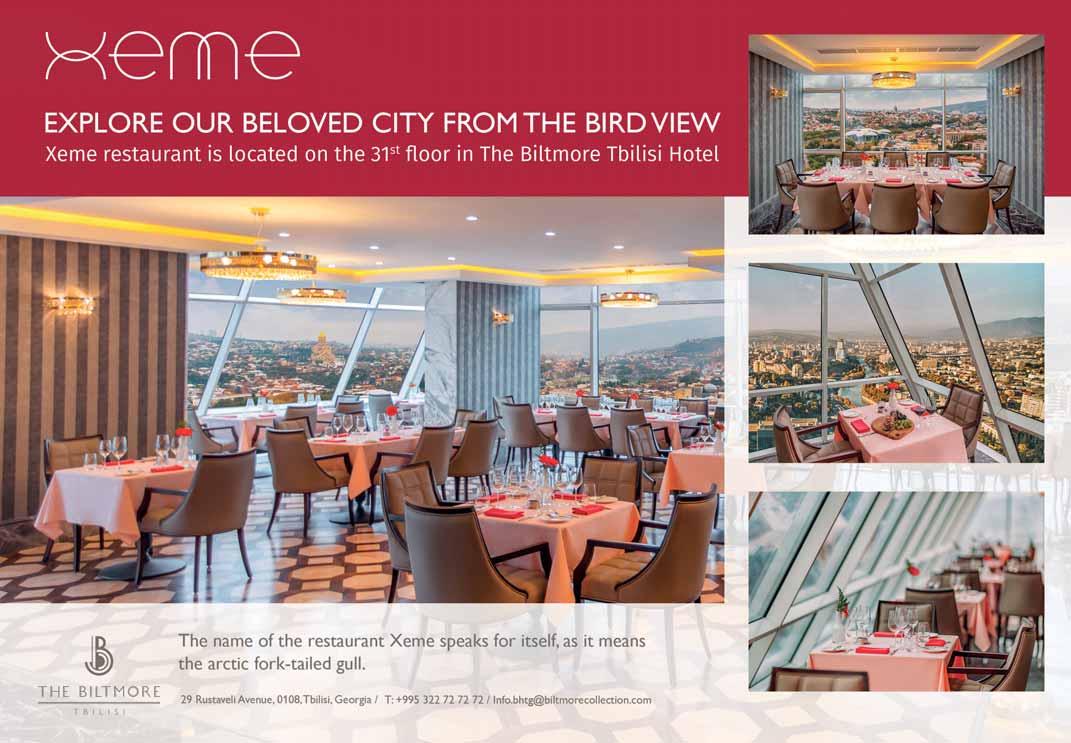 BY MICHAEL GODWIN
BY MICHAEL GODWIN
While the lyrics of the 1968 Beatles classic were only a parody of other contemporary pieces, it may have some notes of truth in today’s Georgia. European Union flags, “move to Europe” stickers, and growing socioeconomic connections to the EU make the country more Western than any of the regional neighbors. Despite this, there have been a number of actions by both the citizens and the government that may bring into question the direction the country is aimed. The country’s relationship with its northern neighbor has long been fraught. Since Kremlin troops assisted in ousting ethnic Georgians from their land in
the early 1990s, invaded in 2008, and have facilitated crimes against Georgians ever since, they have failed to improve. With the recent invasion of Ukraine, Tbilisi has been hesitant to join the West in its harsh condemnations, sanctions, and military assistance programs to Ukraine.
More recently, actions taken by the government raise questions as to the loyalties of its most senior members. These actions have also sparked sharp responses from Europe’s leadership.
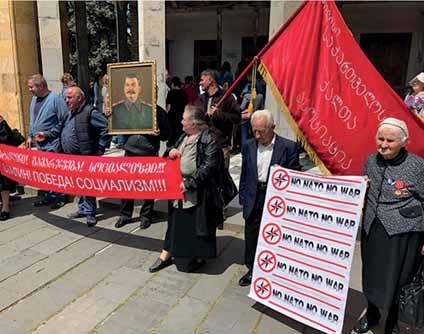
This came to a head in June last year when European Commission President Ursula von der Leyen recommended denying Georgia a pathway into the EU, but was in favor of a pathway for Moldova and Ukraine.
‘The sooner you deliver, the sooner there is progress’, she said, addressing Tbilisi. However, rather than respond with gusto and emphasis on reform and
According to these groups, Ivanishvili and the Georgian Dream leadership is afraid to shake things up too much and anger the Kremlin. This has also reportedly been behind the resistance from Kyiv when asked for military assistance and more overt support. As a result, Ukraine blacklisted several members of Georgia’s elite.
A decree published by Kyiv targeted four important members of Georgia’s most influential elite. Ukrainian President Volodymyr Zelensky’s list included Ivanishvili’s brother, Alexander Ivanishvili and his wife Ketevan Kharaidze, as well as businessman and cousin of Bidzina, Ucha Mamatsashvili and his son Tate Mamatsashvili. According to the decree, “their accounts will be blocked, and entry into Ukraine and transit through it will be prohibited.”
All of this has painted a picture of Georgia shifting back to the Russian world. Tbilisi’s actions may come as a clear sign of Kremlin activities working
Georgia currently does not have the economic capability to completely cut itself off from Russia. While new energy deals are being cemented with neighbor Azerbaijan, Russia gas is still key to keeping the nation running smoothly.
For all of 2022, Georgia purchased approximately $431 million worth of fuel from Russia, a number that is 348% more than a year earlier. Grain, consumer goods, and other key daily life items are still a large portion of imports that cross the border. Georgia quite frankly cannot so easily quit Russia as its Western partners.
From a national defense and security perspective, the country does not have the same footing as Ukraine had. Prior to the February 24th invasion, Ukraine had a population of approximately 44 million people and an armed forces of nearly 200,000 service members. Georgia has less than 40,000 service members, including a virtually non-functioning air force, and a population of
Additionally, should Russia re-invade the nation, getting supplies into the country in a similar way as NATO has done with Ukraine would not be an easy task. Geographically, Russia would have an easy task of cutting the country off from Turkey, the only European and NATO country with any potential of allowing supplies to be delivered overland. All together, the nation would not be able to resist in the same manner as Ukraine.
While the need for a more independent government less connected to the whims of the Kremlin is needed, there is some meaning behind the current game plan. While much of Europe may have the security of NATO and the economic backing of the EU to soften the effect of the removal of Russia, Georgia does not possess this luxury. For the leadership of the nation, rather than having social media spats with Ukraine and Europe, the focus should be on securing the well-being of the nation and gently “breaking up” with the abusive northern neighbor.
GEORGIA TODAY FEBRUARY 3 - 9, 2023 3 POLITICS
Pro-Russian activists demonstrate in Tbilisi. Source: EPA/Zurab Kurtsikidze
A pro-Russian, anti-NATO demonstration on Victory in Europe (VE) Day 9 May 2019 in front of The Joseph Stalin Museum in Gori. Photo by James Derleth
Pulling the Plug on Incoming Russians Will Help Preempt an Impending Iranian Refugee Crisis
OP-ED BY SAAHIL MENON
The ruling Georgian Dream party has long been accused, albeit rightfully so, of playing a double game between Moscow and Brussels. In a sense, the Ukraine conflict serves as a litmus test of where their loyalties truly lie. Solidarity wise, the people of Georgia remain unequivocally committed to standing by Kyiv in its hour of need. It is worth recalling that Georgian auxiliaries from the national legion selflessly volunteered to fight alongside Ukrainian forces when the full-scale war first broke out and NATO essentially took a back seat. Nonetheless, mixed messaging from the current administration suggests that they are not fully prepared to throw their weight behind a fellow ex-Soviet repub-
lic at the receiving end of unprovoked Russian aggression. On the one hand, Georgia’s francophone President Salome Zurabishvili makes no bones of her country’s steadfast orientation to Europe. Yet, there appears to be a coordinated effort on the part of the two-faced government aimed at tacitly stonewalling its so-called “European perspective”. From imprisoning prominent journalists and ex-heads of state on trumped up charges, to an ever-widening disconnect with civil society, Tbilisi has its work seriously cut out in pursuit of EU accession and risks kissing this dream goodbye unless it changes course. Among the internal deficiencies that warrant immediate attention, though, is the nation’s opendoor policy vis-à-vis the citizens of Russia and Iran.
While a Baltic-style blanket visa ban might prove far too draconian for Georgia’s tourism-dependent economy, there are still ways and means for its authorities to curtail the unprecedented influx of Russian nationals. One such remedial measure involves instituting entry requirements for the latter or, at the very least, emulating Kazakhstan’s recent move to do away with immigration loop-
holes that allowed them to overstay their welcome. Not only would an initiative of this kind help decipher the purchasing power of visa applicants, but the consular fees generated can then be channeled to Ukrainian residents in dire need of welfare support. More importantly, however, bringing an abrupt end to the free-for-all at its border with Russia will be a major wake-up call for Iranians who are fleeing their homeland in record numbers and not exactly spoilt for choice in terms of where they can go. Admittedly, a sizeable chunk of these émigrés are well-intentioned, highlyeducated, enterprising and simply after the most fundamental human rights usurped by the Ayatollahs. That said, the regime in Tehran is no stranger to establishing sleeper cells and espionage rings on foreign soil. It would come as no surprise to see the Islamic Republic pull a leaf out of the Kremlin’s playbook in infiltrating other jurisdictions of significance with its foot soldiers. For a lawless theocracy bent on expanding its sphere of influence and advancing its strategic interests abroad, neighboring democracies like Georgia are arguably the lowest hanging fruit.
The Split and Undecided World
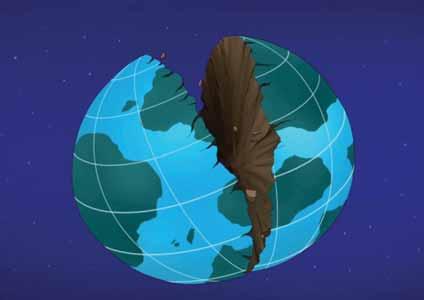
ing between the hammer and the anvil?
Despite being something of a black sheep in the eyes of the international community, Iran has neither grown out of its imperial mindset nor has its military prowess waned amidst crippling, US-led sanctions. Cementing a foothold in the South Caucasus is part and parcel of a calculated foreign policy maneuver that will see the Iranians lock horns with near-peer rivals Turkey for regional clout. As bilateral ties with Azerbaijan hit rock bottom over Baku’s alleged soft spot for Israel and the armed attack on the Azeri embassy in Tehran last week, Georgia will emerge as an even more critical node for the power-hungry Iranians to make their presence felt in a fast up-and-coming geography. At the same time, Iran is bracing itself for a new world order that it believes will inevitably come to fruition in the aftermath of the war. With an already antiTurkish Armenia in the bag and major inroads being made into the Persian Gulf at the expense of Saudi Arabia, there will be no stopping Iran from becoming West Asia’s de facto kingpin if it manages to co-opt Georgia as well.

From the standpoint of the Georgian population, an Iranian soft power pro-
jection in Tbilisi and beyond, coinciding with Russian draft dodgers flocking there en masse, ultimately spells disaster for social cohesion as well as national security.
Thanks to unparalleled support from the West and its outspoken overseas diaspora, the protests in Iran show no signs of subsiding anytime soon. There is a very real danger that those in power could attempt to deflect attention from this insurmountable uprising by arbitrarily taking aim at third countries and engaging in further proxy warfare. There is no love lost between Iran and Israel, with the Jewish state now accused of being behind a string of recent explosions at key Iranian nuclear facilities, as well as stirring up the ongoing domestic unrest that could easily morph into a full-blown revolution. Seven months ago, Turkish intelligence officials foiled an IRGC-sanctioned hit job in Istanbul that sought to take out Israeli tourists and an ex-diplomat as reprisal. There is every reason to be circumspect about a similar terror plot unfolding in Georgia, which has witnessed an exponential surge in inbound arrivals from Israel of late. Walking a tightrope between East and West is proving an increasingly herculean task in light of the current war. Non-alignment has become somewhat synonymous with being apologetic towards the Kremlin. Meanwhile, it is no secret that Iran has much greater skin in the game at present than when the invasion initially took place. Having armed Moscow to the hilt with its lethal Shahed-136 drones, it is only a matter of time before Tehran replaces Beijing as public enemy number two of the West. In the case of Georgia, the writing is literally on the wall. Anti-Russian graffiti throughout the capital speaks volumes of how averse locals are to hosting those who propped up President Vladimir Putin and his cronies. There is no doubt that this undercurrent of malaise will also permeate to Iranian migrants desperate to make their way out of an unlivable environment. Having failed to get the memo thus far, it is incumbent on the Georgian government to make amends for their earlier slip-up by heeding the will of the people. Travellers from both Russia and Iran can be dissuaded from entering Georgia with the stroke of a pen. Depending on how Tbilisi chooses to play its cards this time around, they can either kill two birds with one stone or bear the socioeconomic brunt of a two-pronged humanitarian catastrophe in the making.
The world has never been united and monolithic. It was, is, and will always be divided, belligerent and antagonistic, the strongest corroboration of which is the obvious failure of the overly hopeful human attempt at felicitous and successful globalization. The only consolation here might be the thought that a globalized, monochromatic and monotonous world would be much less enjoyable than the diversified, multicolor and polyphonic one we have.
The latest pattern of mankind coming apart is its contradictory attitude toward the war in Ukraine, which is no longer qualified as just another trivial clash between two nations, Russia and Ukraine, but a real proxy war between the isolated Russia and the consolidated collective West, adamantly and iron-handedly headed by the United States.
Isn’t it frustrating that the world has all of a sudden (more precisely, since the 24th of February, 2022) found itself liv-
On the one hand, we are concerned with the idea of holding up Ukraine as a fresh symbol of the unmitigated fight for freedom and democracy in the world, and on the other, the selfsame world is shuddering with fear that the cornered and beleaguered Russia might press the nuke button in desperation, leading the Earth to incineration.
We all know a way out of this worldwide limbo has to be found forthwith, but the newly crystallized geopolitical cul-de-sac seems to be heavily blocked by Ukraine’s fair-enough reluctance to give up even an inch of its desperately fought for land, and Russia’s foisted-onthe-West stubborn persistence that the occupied Ukrainian lands legally, morally and historically belong to mother Russia. At this point, it is the most unsolvable problem the world has ever been faced with in its long and war-rich history. Not even an expert in the field of political science can or will tell us right now where the key to the solution of this mind-boggling dilemma lies.
The world is in an utterly perilous expectation, bereft of human readiness to use reasonable efforts to save the globe
from the incipient disaster. And there is not an iota of exaggeration in this seemingly pessimistic statement. The irreversible facts of our current life on earth speak volumes: Additional arms are heading onto the already burnt Ukrainian soil to keep killing the young and the old indiscriminately; the conquered country continues to be heavily bombed; people are abandoning their homes in fearful haste to find abode somewhere beyond the boundaries of their motherland; the infamous military blocs are bringing additional nations into their ranks; the majority of countries are augmenting their military budgets; some of those triggerhappy combatants are celebrating their lethal success all over the place; the overly complacent geopolitical giants, in their ambition and unjustified desire to shape international relations to their own discretion, are becoming more and more hostile towards each other; human life is much cheaper than it was yesterday; the arms race has reversed to its Cold War modus operandi, and the nuclear variable is becoming a clearly decisive factor in the current geopolitical equation. What else is left among the worst things that could happen to humankind
in its millennia-old endeavor to make life more livable on our old and wellweathered earth? The impression is that the modern world is running amok, and God has washed His blessed hands of it. The Tower of Babylon is being reinvented so that the human race never speaks a mutual language again. Meanwhile, as these bitter-tasting words are being written both in stone and in the stars, the havoc and mayhem continue in Ukraine, faltering on the brink of
total annihilation, and the powers that could but won’t stop the unlikely-forthe-21st century chaos are sitting and imperturbably playing with a fire that has the undoubted potential to turn into a real conflagration. Firefighters, if there are any left, would be like doctors coming after the patient has died. Question: Why has the world become so devoid of soul and wit? Why does it remain as egregiously split and undecided as it has always been?
GEORGIA TODAY FEBRUARY 3 9, 2023 4 POLITICS
Iranians continue to fight for democracy, freedom and justice inside and outside Iran while denouncing the regime's violence, censorship and brutal repression. Source: AFP
From the standpoint of the Georgian population, an Iranian soft power projection in Tbilisi and beyond, coinciding with the Russianincoming draft dodgers, ultimately spells disaster for social cohesion as well as national security
Image source: dragonball.fandom
OP-ED BY NUGZAR B. RUHADZE
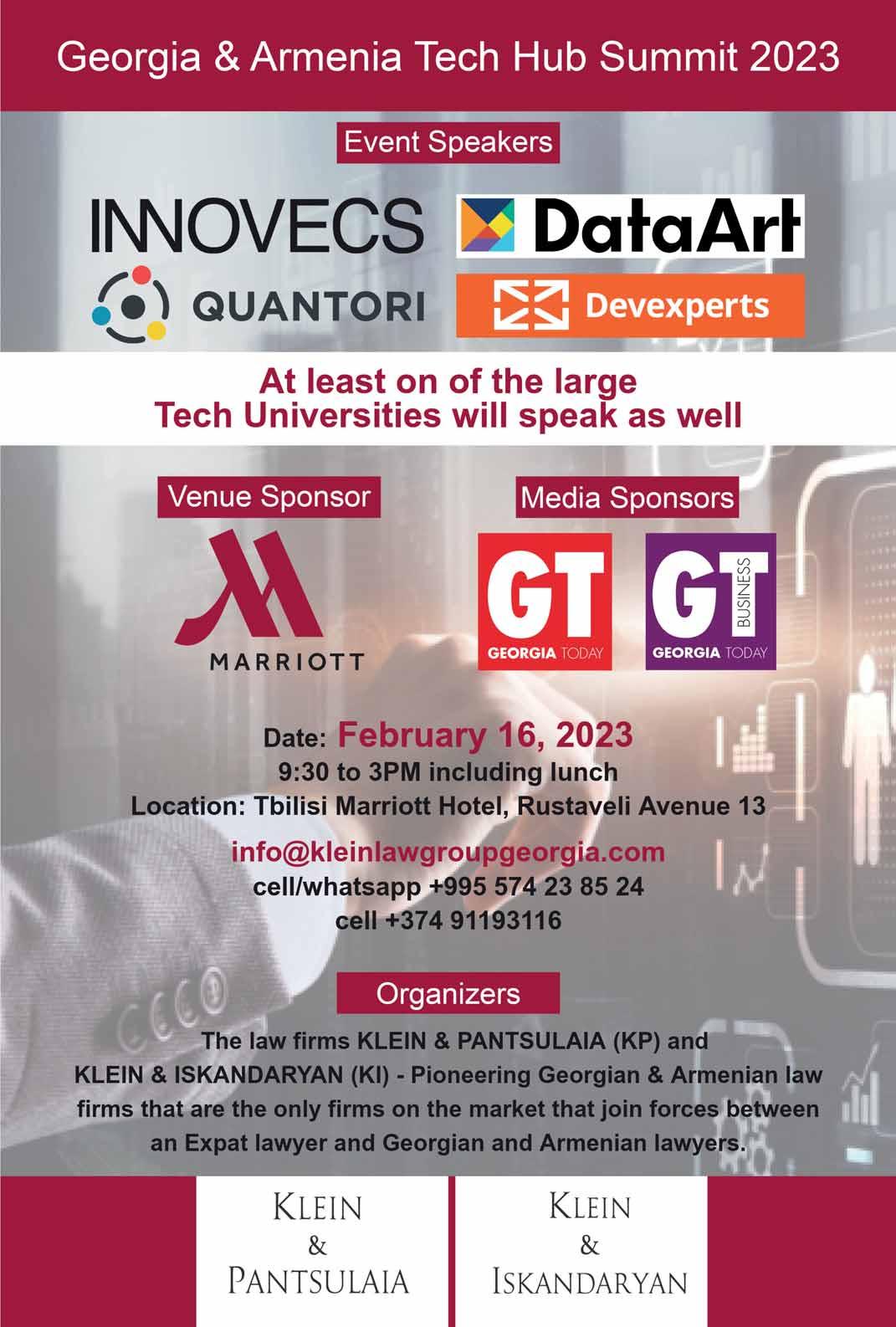
Yermolenko: From Pushkin to Putin
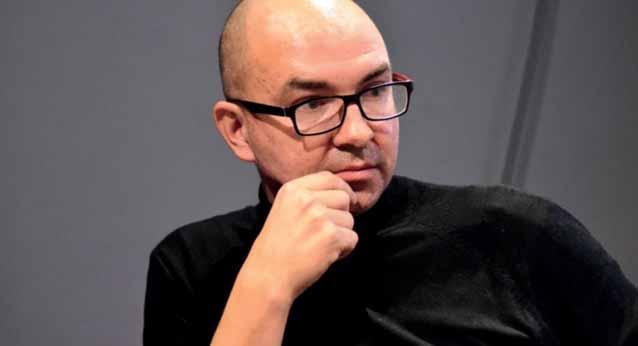
Russian expansion: Poland, Ukraine and Crimea. She started the first Russian annexation of Crimea, she destroyed Ukrainian Cossack autonomy, and she participated in the first partition of Poland. I think we should consider her as an imperialist expansionist who not only sought to erase our national identities, but also to expand the idea of one centralist empire in the region. And now we are witnessing the return of this antiImperial statehood. First was the independence of Poland in the 20th century, and now we have the rebirth of the Ukrainian and Crimean Tatar identities. And I think we could say the same about the Caucasus.
SHOULD UKRAINE’S ERASING OF SUCH MONUMENTS TO IMPERIALISM GUIDE OTHER POST-SOVIET COUNTRIES?
INTERVIEW BY VAZHA TAVBERIDZE FOR RFE
In his essay in foreign policy, titled: “from Pushkin to Putin” Ukrainian philosopher, essayist and editor of Ukraine World, Vlodymyr Yermolenko, took a swipe at Pushkin, Lermontov, Gogol and Dostoyevsky, amongst others, labeling them as “imperial writers.” Their view was that it is provincial thinking, a nationalistic resentment, not to have art or literature transcend nationalistic boundaries. Some say Pushkin, Lermontov, etc. were all the sons of their epoch, and they shouldn’t be judged through a modern lens, but on their literary merit. Radio Free Europe’s Georgian Service addressed the author to hear his counter argument, as well as his outlook on the current happenings in Ukraine.
“I think these arguments are precisely provincial and blind, because we should be reading literary texts very closely, as very often they show the symptoms of certain power discourses in politics, and those things found in Pushkin, in Lermontov, definitely show this,” he tells us. “For example, let’s take Lermontov’s text “Mtsiri” about the Caucasus – for one Russian literary critic, who criticized me, this was a text about how a Russian poet tries to identify himself with a Caucasian Monk. For me, it’s absolutely different: It’s the way a Russian poet tells Caucasian nations, Georgians and others, “look, you are in the past, you have only the past, you don’t have the present and you definitely don’t have a future; the only thing you’ve got is nostalgia for the past.” And this actually corresponds to what is happening today, with Russia saying to Ukrainians, “okay, guys, you probably had a different past to ours, but we are the same nation, we have the same people and if you don't agree with that, we will punish you.”
WHAT DEFINES THE UKRAINIAN IDENTITY?
The banal response would be that it’s the spirit of freedom, individually and the freedom of the nation, of community.
If I had to explain it to a six-year-old, I’d say that we Ukrainians decide everything by ourselves; we are responsible for our actions; we do not wait for orders from above. Neither orders, nor punishments, nor incitement to act, and this is what differentiates us from tyrannies in which people are slaves, where people do not feel the capacity to act, to think with their own minds or their own lives.
EVERY NOW AND THEN, A WESTERN SCHOLAR WILL ARGUE THAT THIS WAR IS THE TRUE BIRTH OF THE MODERN UKRAINIAN STATEHOOD, THAT PUTIN SHAPED THE NATIONAL MYTH OF THE COUNTRY HE HIMSELF DIDN’T BELIEVE EXISTED. BRITISH HISTORIAN MARGARET MCMILLAN SAID “PUTIN IS THE FOUNDING
FATHER OF THE UKRAINIAN INDEPENDENCE”. WHAT DO YOU SAY TO THAT?
I think it is wrong to say that because it just gives too much credit to Putin. If you look at Ukrainian society of 100 years ago, you will see the same processes. If you look at Ukrainian Cossacks in the 17th century, you will see similar things. Ukraine as a nation is quite old. The problem is that it was not really recognized, not really seen from outside, for different reasons. The big difference of our fight today with our fight 100 years ago is that nobody cared about Ukraine 100 years ago. And, therefore, the disappearance of this independent state was met with absolute indifference in Europe, in America, elsewhere.
I CAN RELATE AS A GEORGIAN BECAUSE WE HAD SIMILAR ISSUES WHEN WE HAD THE FIRST GEORGIAN REPUBLIC (1918-1921) WHICH LASTED ONLY THREE YEARS.
Right, exactly. There are lots of parallels between Georgia and Ukraine. We needed to wait for 100 years. I think it is wrong to give credit to Putin, because Putin was reacting to ongoing processes. He understood that these processes for him were going too far; he tried many other ways to stop it, first with propaganda, then with a network of spies and agents, then he tried to put a puppet government with Yanukovitch, etc.
Putin is like Shakespeare’s Macbeth. This is classic literature about a point in history where every step the tyrant makes brings him closer to the abyss, and that’s what Putin is doing. Violence and war is an instrument of the last resort. And it only accelerates the Ukrainian identity. It strengthens it, but it doesn’t create it.
ONE OF THE FACETS OF THE UKRAINIAN IDENTITY IS UKRAINE FREEING ITSELF
FROM RUSSIAN INFLUENCE, A STRUGGLE THAT IS NOT RESTRICTED SOLELY TO BATTLEFIELD VICTORIES: TWO QUITE PROMINENT MONUMENTS OF EMPRESS CATHERINE THE GREAT AND GENERAL SUVOROV WERE REMOVED FROM ODESSA. IS THAT ALSO AN ACT OF REJECTION? IS THAT A SHAPING OF THE UKRAINIAN IDENTITY?
Of course, because Catherine is another side of the same coin of Russian imperialism for us. Russian imperialism tried to put the symbols of the empire everywhere it reached, which is why we have statues of Lenin in every town, had streets named after Pushkin in every town. The Ukrainians should ask themselves: Why do we have monuments of Pushkin in Kyiv, but no monuments to writers from Kyiv, or someone like historian and archivist Volodymyr Antonovych, or people who created, at some point, Kyiv’s identity. This is the imperial approach to erasing the local history, to replacing it with the imperial one. And, of course, we should get rid of it. We should bring back the names, the histories, the works of art, the ideas, that were taken from us.
THERE WERE SOME CRITICS OF THAT MOVE, ARGUING THAT UKRAINE IS REJECTING ITS OWN HISTORY, CONSIDERING THE EMPRESS CATHERINE IS BELIEVED TO BE THE FOUNDER OF THE CITY OF ODESSA.
People who know the history of Odessa know that before Odessa, the settlement was called Khajibey. To this day we have restaurants in the city called Khajibey. This was a settlement, like many other, which Russia created on top of an existing one. Catherine played a very negative role for Eastern Europe because she destroyed three national statehoods, which are now resisting to the last the
HOW DO WE DETERMINE WHAT STAYS AND WHAT GOES? LENIN MIGHT BE EASY TO CAST AWAY, BUT IT WILL BE DIFFICULT TO ASK THE INHABITANTS OF GORI TO DO AWAY WITH THEIR STATUES OF STALIN, OR FOR US TO TAKE DOWN THE STATUE OF GENERAL BAGRATIONI IN TBILISI.
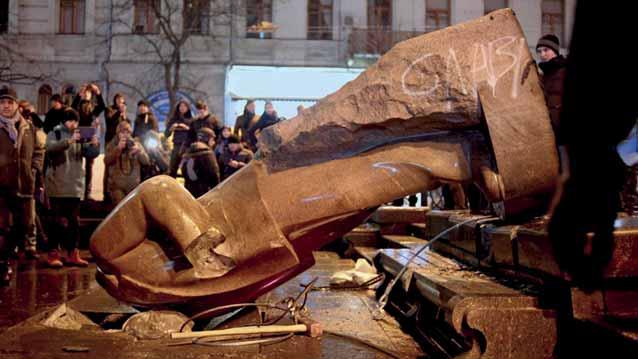
In Ukraine, we had a Prince Bezborodko, the Grand Chancellor of the Russian Empire and one of the creators of the Russian education system in the early 19th century. We had people like [cleric and theologian] Teofan Prokopovych, who helped Peter I to create the Russian Empire. We have Gogol, who created Russian prose. I think Gogol will stay. I personally have a lot of questions about him, but it's okay to have questions about historical figures, to discuss, to point out any ambivalence. I think it’s the same with Bagrationi. I don’t know Georgian history in detail, I only remember this paradox, where I was thinking, why is it that the key commanders during the Napoleonic wars didn’t have Russian names, except for Kutuzov and some others? There were Germans, there were Georgians, and it shows that Russia does not exist as a nation [state], that Russia is a mixture of everything, a kind of vinaigrette; an empire that sucks all the best things from the colonies. The presence of figures like Pushkin should definitely be diminished in our streets. Why Pushkin and not Byron, for example? Byron created a much better image of Ukrainian Hetsman Mazepa, so it’s better to have “Byron Street” in the center of Kyiv than Pushkin. We shouldn’t erase those Russian figures, but I think we should definitely diminish their status of omnipresence.
WHAT’S THE SAVING GRACE FOR GOGOL? THAT HE WAS BORN IN UKRAINE? OR THAT HE IS GENUINELY A WORLD-CLASS WRITER?
Well, Gogol is part of our culture. We can be critical of him, but he's definitely part of our culture. People consider him as ours, our writer, but we have big ques-
tions as to the way he interprets the Russian Imperial narrative.
“FIGHTING MONUMENTS IS THE LAST FIGHT,” – SAID ONE PROMINENT RUSSIAN THINKER,
THE REASONING BEING THAT THEY CANNOT FIGHT BACK. WHAT DO YOU SAY TO THAT?
It's not a fight with the monument, it’s a fight with their presence. When we remove or rename Pushkin Street, we can argue that what Pushkin was saying in the 19th century, be it in “Poltava” or in “Slanderers of Russia,” is now being repeated by Russian propaganda. It’s a certain continuity, and we are against this imperial continuity. Just to give you one example, when Russians occupied Kherson and used the local theater, they made it stage Russian plays instead of the original repertoire, and the play they opted for was Mikhail Bulgakov’s “White Guard”. They still use such names, plays, texts, to erase local culture and replace it with their own.
Russian liberals really lag behind in many ways. I follow some of them quite closely and they are two steps behind; still in this privileged stage of Russian culture. They are incapable of thinking in the way Ukrainians and Georgians and other nations think, because we think from the position of nations which were oppressed for centuries, and they just can't ubderstand this position. And so instead of starting to understand it, make efforts to understand it, they just show the traditional feeling of Russian superiority towards any other nation. Putin is evil, but beyond him there is great Russian culture which serves as sort of indulgence for the crimes they commit. To this talk of an “alternative Russia,” I’d say there is no alternative Russia. We certainly can’t find it in the texts of Russian literature. Russians should be looking for this alternative, and they have a very big task to complete. Their problem is that they don't really have in their culture, with some exceptions, of course; they don't have a clear political program which could serve as an alternative to that Russian Imperialism. They don't change. They do not produce visions of society like those produced in many European nations, including in Ukraine; this idea that society should be based on free individuals with rights. Instead, in the Russian culture, there is a leitmotif of this so-called Panunity, as Russian philosopher Vladimir Solovyov said, which means that every individual difference should be dissolved in some higher entity. This totalitarian trend in Russian culture was present in Russian slavophiles in the 19th century, certainly in Doskoyevsky, certainly in Russian religious philosophers like Ivan Ilyn and others who pose a basis for Putinist and Eurasianist ideologies. I think Ukrainians, Poles, Georgians do have the right to say to the Russians, “you just are blind to certain aspects of the [Russian] culture, and we can be your psychoanalysts, we can actually shine light on some unconscious things that you're not aware of,” and I think they should listen to us. The problem is, they haven’t started to listen to us yet.
PUTIN SEEMS TO BE
BANKING
ON

MAKING
THIS WINTER AS
UNBEARABLE
FOR UKRAINE AS POSSIBLE – JUST HOW LONG MIGHT THIS WINTER BE FOR THEM?
I don't think he’ll succeed. We’ve been very accustomed to living without electricity and water for some time now. Ukraine is resilient. If Putin was thinking that missile strikes on Ukrainian civilians and cities would push Ukrainian back, and stop them shooting, that’s not the case. It just makes Ukrainians angrier, more resistant, and more willing to help the army. Putin is making a mistake after mistake, and crime after crime. I compare him to Shakespeare’s Macbeth because this is a classic tragedy, a classic piece of art about what happens to a tyrant when he sets upon the path of crime. And the problem for the tyrant is that with every step he makes, things get worse for him.
GEORGIA TODAY FEBRUARY 3 9, 2023 6 POLITICS
The destruction of the Lenin monument in the center of Kyiv, 2013.
Photo by Maks Levin/Reuters
Ukrainian philosopher, essayist and editor of Ukraine World, Vlodymyr Yermolenko
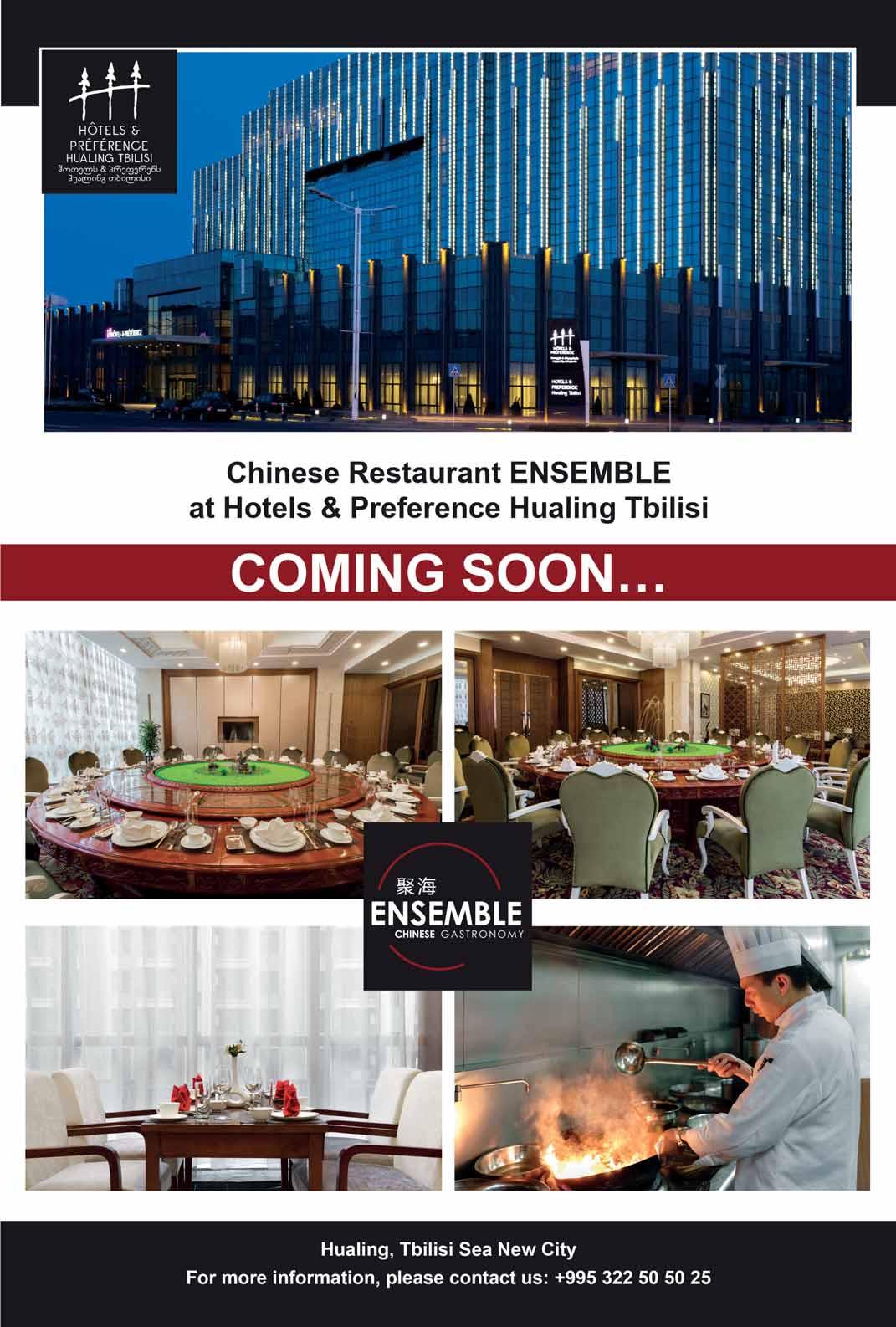
Significance of the Middle CorridorUnderestimation Is Unacceptable and Overestimation Is Impossible. Part 2
BY VICTOR KIPIANI, CHAIRMAN OF GEOCASE
Generally, the implementation of a major project is not connected only with the purely economic dimension, and security considerations are its natural parallel phenomenon.
In this sense, the Middle Corridor initiative, given the very complex geographical area of the route and the countries along it, will not only be no exception, but will be full of complex and contradictory layers of security. It is also clear that the corridor will divide countries into two large groups: One will benefit from the project, while the other will lose from its implementation.
The security challenge has become particularly urgent against the backdrop of the war in the heart of Europe, as well as developments in the Middle East. Here, we do not specifically address one of the most critical issues of the Middle Corridor - the status of the Caspian Sea. Although significant steps have been taken in recent years regarding its status, some legal aspects are still unclear. In any case, the regime of the Caspian Sea requires a separate qualified consideration, and in this article we only summarize the security challenges of the Middle Corridor.
The specifics of the project lie not only in the narrow transport but also in its energy component. Thus, the relevant infrastructure includes various offshore or onshore installations, connecting facilities and communication arteries. In short, it is a huge geo-economic space that needs careful protection. And in the context of such a large project, some may find it almost impossible to provide absolute protection.
In the section on the competitiveness of the Middle Corridor, we have already mentioned that in this respect it has a different correlation to the Northern and Southern directions. At first glance, even this circumstance largely determines the difference between supporters and opponents of the project.
Despite the obvious forms of aggression in our time and the return of conventional wars between the great powers, we believe that the Middle Corridor project is more threatened by quasi-state actors than by formal state structures. This is with the caveat that the line between "state" and "quasi" has now been erased, and the "state" uses "quasi" to achieve the same public policy goals.
One of the best examples of this is the Wagner Group, operating outside Russia, and the Islamic Revolutionary Guard Corps, operating outside Iran. All the more so as this "disguised" form has recently been promoted by official structures, and the trend will increase, both within state financed terrorism and in other latent formats. It is not the task of this article to assess the practical ability of these military units or, if you will, the likelihood of their attacking transport communications. Here, we only want to note that when considering the threats associated with the Middle Corridor, the protection component of the relevant infrastructure should be scrupulously considered. Of course, a number of crossborder projects have accumulated enough knowledge for us. The experience of Baku-Tbilisi-Ceyhan and Baku-TbilisiErzurum are also very valuable. However, it is also a fact that technology is changing rapidly, and with it the methods of terrorism, diversion, and sabotage, and the methodology of their implementation is very different from the once
familiar orthodox "operational culture".
That is why the corresponding countermeasures require a much broader institutional and strategic understanding on the part of the beneficiaries of the Middle Corridor project.
FURTHER PROMOTING THE MIDDLE CORRIDOR
Above, we have mentioned the challenges that need to be addressed in order to launch and successfully operate the Middle Corridor Project. We also mentioned and briefly described the challenge of a separate major category.
It is a fact that the working process in this regard is moving forward, and at this point the status is very encouraging. For example, the signing of a so-called "road map" by the foreign and economic ministers of Georgia, Azerbaijan, Turkey and Kazakhstan was devoted to solving a number of key aspects in the long term. In parallel with highway issues, the mentioned document is aimed at eliminating so-called bottlenecks for transit and improving coordination on streamlining transport infrastructure in the Caspian Sea and Black Sea region.
Along with the specific contributing factors, it is necessary to note the general attitude supporting the project. This background, expressed through direct or indirect actions or statements, is no less important than the issuance of a political and legal act. For example, the Cooperation Council of Turkic-speaking States has assigned a special role to improving the transport potential of the Middle Corridor and its competitiveness.
The Kazakhstani authorities' unequivocal call last July for Kazakhstani companies to seek alternatives to the Russian route is of great importance.
The viability of the Middle Corridor is also strengthened by the agreement between the EU and Azerbaijan to double the supply of natural gas to the European market. Although the above-mentioned deliveries are carried out through separate communications, the TransAnatolian and Trans-Adriatic pipelines, their combined effect will again serve to strengthen the Middle Corridor, which runs through the region.
Speaking of the circumstances contributing to the project, the plan to diversify it with digital content is particularly noteworthy. The introduction of new technological innovations aimed at digitalizing the Middle Corridor will take the project to a completely different
dimension, giving it long-term competitiveness and high quality commercialization. Equipping the Middle Corridor with digital technologies is the goal of the roadmap, which, as we mentioned, has already been signed, and involves improving technological standards along the Middle Corridor route, implementing appropriate algorithms, and developing infrastructure and operational capabilities.
Recent processes also require a renewed approach on the part of the West. There are many examples of a turn toward the region (e.g., the EU's two-billion-euro program to deepen transport cooperation in the Eastern Partnership format (together with Azerbaijan)), but such a turn requires more consistent policies and greater investment. Targeted programs to integrate the Black Sea and Caspian Sea markets and unify the rules of the game for cross-border projects would also be highly desirable in the prism of this stage of cooperation.
And another opinion, this time related to a more objective reality: neither China nor Turkey - the two key participants in the Middle Corridor project - should have much desire to depend on Russia in terms of cargo flow. This is largely due to the fact that China is against the strengthening of Russia's position in Central Asia, while for Turkey, cooperation with Russia is dictated only by a tactical motive, the so-called "marriage for convenience."
NEW CONTENT, NEW DIMENSION
We mentioned in the article that our region is characterized by developments and changes in a rapid, compressed time frame. Without going too far, it is enough to mention the relatively short period of time between the idea of writing this article and its publication. In that time alone, two such fundamental projects have been announced that will have a direct and lasting impact both on filling the Middle Corridor with new content and on our region's transition to a new geopolitical and economic dimension.
One of them - the deep-sea port of Anaklia - is a project of Georgian "origin" from beginning to end, the construction and operation of which heralds a high degree of integration of Georgia into the broader economic picture. The credibility of the announced initiative is based on the readiness of the state to participate in the construction of the
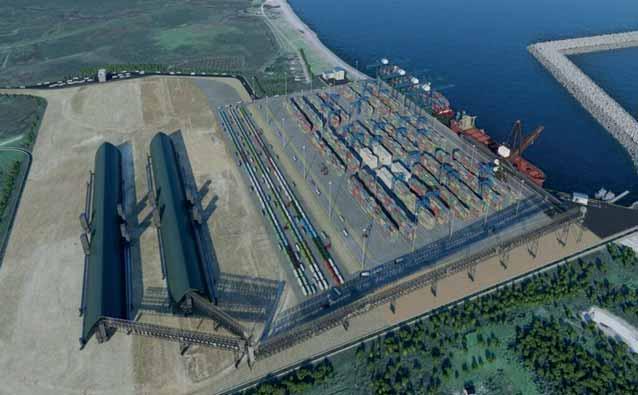
politically and geoeconomic optimal positioning of the country. Accordingly, after demonstrating the appropriate will, it is now a question of our national willingness and proper fulfillment of specific obligations: to turn these projects (as well as other relevant initiatives) into real, practical benefits.
MORE THAN A PROJECT
Anaklia Port. This is the signal of conviction and firm intention not only to its own but also to the international audience, which should dispel any hesitation or doubts. Obviously, the rest will show in the near future, as the realization of the Anaklia project will have to overcome a number of objective and other possible obstacles.
Another initiative that is now being implemented and which will have a profound effect on processes in the region is the Black Sea underwater power line project. Much has been said about its multidimensional strategic importance. However, given the regional impact of the mentioned project, it is never superfluous to return to this topic and highlight it. We also want to focus on some critical aspects in this article. Some of them have already been mentioned more than once, and others we will formulate with new emphases. In particular, the Black Sea underwater power transmission line project: (1) will lead to the transition to clean energy; (2) will contribute to the decarbonization of the economy; (3) will be a communication line connecting the two extreme shores of the Black Sea and the Caspian Sea; (4) will create the basis for Georgia to become an electricity hub and integrate the country into the EU electricity market; (5) will encourage new investments in the Georgian energy sector and at the same time support improving the social background; (6) with increased production and supply of electricity, will help our country better position itself in the region not only as a transit connector, but also as a contributor; (7) together with new economic opportunities creates the basis for greater security for Georgia; (8) by activating an additional powerful belt of interconnection and interdependence will create new motivation for stability and prevention of complications in the region. Practically, participation in the Black Sea underwater power line project helps Georgia update the main identifying mark of its economic and national security - the functional need and practical usefulness of the country. After all, the real function is the main principle of protecting Georgia's state interests, which we have talked about many times. Thus, after the high-profile projects of the last century (Baku-Supsa, Baku-Tbilisi-Ceyhan, Baku-Tbilisi-Erzurum), the underwater power line and Anaklia projects are indicators of the next order of geo-
We believe that through the opinions and assessments presented in this article, we have once again reminded readers of the multilayered and multifaceted purpose of the Middle Corridor project. Almost all along the corridor line, it is planned not only to arrange the infrastructure logistics necessary for transportation and transit, but also to develop a qualitatively different format of coordination between the countries participating in the project, adapted to modern requirements. In a new world in which there is a great lack of predictability and clarity of events, targeted cooperation initiatives can make up for this deficit by playing a kind of compensatory role. Along with other means, we believe that it is precisely such targeted projects that enable the selfsustaining functioning of a major economic hub that has emerged against the background of the trend toward a so-called regional networking (hub-and-spoke), as well as interaction and interconnection with other major hubs.
The connection through the Middle Corridor project is actually a kind of a hub. Its operation, together with various micro-tasks, serves two main purposes:
(1) to improve the socio-economic background through the operationalization of the corridor, to create a welfareenhancing belt, and (2) to attempt a kind of reincarnation of the concept of "Angellism" (according to its author, Norman Angell) in the large geographical space of the corridor, where free trade and greater interdependence between countries should apparently drastically reduce the possibility of wars and conflicts.
This approach to achieving "peace through economics" is as interesting as it is relevant and controversial. And the Middle Corridor project is likely to fall within this broad range. "Running through" projections for years to come would not be a serious undertaking at this point. However, there are already several variables that will affect the implementation of the Middle Corridor project. In order not to engage in the listing of such variables in the overall picture, and specifically with regard to the large Black Sea region, these are: (a) the dynamics of relations between Azerbaijan and Russia; (b) Turkey's renewed role in the region; (c) the likelihood of a peace agreement between Azerbaijan and Armenia and (d) the prospects for normalization of relations between Turkey and Armenia.
The fact is that the Middle Corridor Project additionally demonstrates that the processes in the geographical area of its coverage have approached a new stage. This is especially noticeable in one of the most dynamic and complex regions of the project - the Black Sea region. Here we can talk not only about a stage, but also about a kind of historical crossroads. It is understandable that we all want events to have a proper development that is acceptable to Georgia's interests. And this requires both lucky objective factors and our individual intervention. What is undeniable and characteristic of this time is the rapid pace of change, without undue delay. Thus, it is possible that by the end of this year, a number of assumptions mentioned in the article will virtually materialize, and one or another caveat will become a concrete circumstance.
GEORGIA TODAY FEBRUARY 3 9, 2023 8 BUSINESS
The deep-sea port of Anaklia is a project of Georgian "origin" from beginning to end, the construction and operation of which heralds a high degree of integration of Georgia into the broader economic picture. Source portseurope.com
Carrefour Freezes the Prices of 1,000 Products

Carrefour, which is owned and operated by Majid Al Futtaim in Georgia, is launching a Price Freeze – stabilising the cost of 1,000 items. This underlines the brand’s commitment to defending the purchasing power of its loyal customers.
The global economic situation is challenging right now, affecting communities in Georgia with an annual inflation rate
SOCIETY
of 9.8 percent. To tackle inflationary pressures and improve the purchasing abilities of its customers, Carrefour has promised to freeze the prices of 1,000 different products across all categories.
The leading retailer has negotiated with a huge range of suppliers to ensure the best possible prices and long-term stabilisation. This means that despite the recent increase in the cost of living, Carrefour’s prices will remain unchanged
for at least 3 months.
‘We care about your savings’ is the main slogan of the newly launched campaign, which allows customers to manage their spending against the background of the challenging economic conditions. The Price Freeze aims to give shoppers reassurance and confidence in the knowledge that hundreds of daily necessities will stay at the same great price for months to come.
Since its establishment in the country, the French brand has always supported and strengthened its surrounding communities in times of crisis – be it maintaining low prices and high suppliers during the COVID-19 pandemic, or helping vulnerable groups through various social initiatives.
Carrefour prides itself on its commitment to bettering the lives of its surrounding communities, and is guided by
its desire to operate in an environmentally and socially-responsible manner. Its various sustainable projects have been successful in raising understanding around environmental protection and have also supported the socially vulnerable.
The Prize Freeze showcases Carrefour’s role as a trusted partner creating value for the industry and economy, always there to support in difficult times.

The Plant Based Treaty and Georgia’s Growing Team of Vegan Activists
BY KATIE RUTH DAVIES
There is a climate, ocean and biodiversity crisis. Fossil fuels and animal agriculture are the driving force behind runaway global warming as well as extensive biodiversity loss, large-scale deforestation, species extinction, water depletion, soil degradation and ocean dead zones.
Last Saturday, January 28, International Day against Global Warming was celebrated worldwide, with the intention to raise awareness about, and encourage people all over the world to do their part in taking care of the environment and the planet by reducing their carbon footprint.
The Plant Based Treaty Georgia and Vegan Georgia teams took it as an opportunity to remind the public that one of the best ways to reduce global warming is to switch to a vegan diet.
“One of the principal causes of global warming is animal agriculture,” they say, “which leads to the emission of carbon dioxide and other greenhouse gasses. Unable to escape into space, these gasses become trapped in the atmosphere, causing the planet to gradually warm over many decades. This then has an effect on climatic patterns, leading to long-term climate change that brings more storms, floods, droughts, forest fires and more extreme temperatures. Melting ice caps bring rising sea levels that threaten coastal cities, while greenhouse gasses that are absorbed by oceans make them more acidic, threatening coral and marine life.”
Leading up to January 28, the Plant Based Treaty (PBT) and Vegan Georgia teams promoted Saturday’s “tweetstorm” to put pressure on politicians, and to demand the adoption of a Plant Based Treaty as a companion to the UNFCCC/
Paris Agreement as a step to put food systems at the heart of combating the climate crisis.
Pictures of activists were shared, showing them holding signs with: “Fight the Climate Crisis, Endorse the Plant Based Treaty,” and standing in front of wellknown locations throughout the country. GEORGIA TODAY sat down with two of the local organizers to find out more. More information about the Plant Based Treaty can be found below the interviewees’ answers, and at plantbasedtreaty.org, where you can also sign up to do your bit towards fighting climate change.
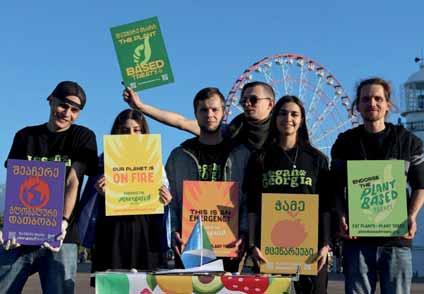
WHAT BROUGHT YOU TO GEORGIA AND THE PBT?
Hoshimi: Interest in Georgian culture, especially Georgian dance and music, brought me here, and I’ve been working in the video team of the PBT since the launch of the campaign in August 2021.
Oleg: I came to Georgia in May 2013 to
help organize the first vegan festival. That September, I settled here to continue doing animal rights activities. I met Hoshimi from the PBT team when I was a co-organizer of the International Animal Rights Gathering 2022 and she applied as a speaker. I instantly fell in love with the whole concept of PBT and their efforts.
HOW HAS RECEPTION BEEN IN GEORGIA SO FAR TO THE PBT, AND VEGANISM IN GENERAL?
Hoshimi: We started the PBT Tbilisi team in September 2022 and since then have built a strong team, and we hope to keep growing. Cafes such as Kiwi, Living Vino, Prinz Bar, and Falafel Box in Tbilisi have endorsed the PBT, and are helping raise awareness about the link to animal agriculture and the climate crisis by placing our posters, fliers, stickers, etc.
Oleg: The perception of veganism in the context of the PBT agenda is very
positive, the same as the message of PBT itself, and it feels like it is going to succeed in Georgia.
WHAT MORE NEEDS TO BE DONE HERE?
Hoshimi: More awareness raising is needed not just here, but worldwide. Our aim is to have plant based menus accessible at hospitals, schools, prisons, etc.
Oleg: I’m hoping PBT can help “veganize” the menus of universities, prisons, kindergartens and other governmental facilities, an issue first brought up by Vegan Georgia, the first vegan NGO in Georgia, that I also represent.
WHAT CAN INTERESTED PEOPLE DO TO CONTRIBUTE TO THE GROWTH OF PBT/CLIMATE AWARENESS IN GEORGIA?
Hoshimi: Every day, people can do their bit by endorsing the PBT on the website, sharing our social media content, and by going vegan! We have free resources like a vegan starter kit booklet in Georgian, plus for English speakers we have free vegan challenge programs you can sign up for, also on our website Another thing people can do is to join the PBT team if in Tbilisi and volunteer for actions, and folks in other cities can start their own PBT team!
Oleg: Many things can be done in order to get people interested in the PBT and veganism, like plant-based food giveaways, social media content and different kinds of street activities like the upcoming Climate March.
ABOUT THE PLANT BASED TREATY
As a companion to the UNFCCC/Paris Agreement, The Plant Based Treaty initiative is a grassroots campaign designed to put food systems at the forefront of combating the climate crisis. Modeled on the popular Fossil Fuel Treaty, the
Plant Based Treaty aims to halt the widespread degradation of critical ecosystems caused by animal agriculture and to promote a shift to healthier, sustainable plant-based diets. The global PBT team is urging scientists, individuals, groups, businesses and cities to endorse this call to action and put pressure on national governments to negotiate an international Plant Based Treaty.
The three main greenhouse gases, carbon dioxide, methane and nitrous oxide, are at record levels and rapidly accelerating; animal agriculture contributes to all three but is the main driver of methane and nitrous oxide emissions globally.
Animal agriculture is driving indigenous land theft in the Amazon; subjecting racially and ethnically marginalized communities to disproportionate amounts of toxic waste from factory farms and slaughterhouses, as well as exposing workers to toxic chemicals, hazardous working conditions and severe trauma. Scientists warned in the IPCC sixth assessment that we need to cut methane or face collapse. Lead reviewer Durwood Zaelke said methane reductions were probably the only way of preventing temperature rises of 1.5C above preindustrial levels, otherwise extreme weather will increase and several planetary tipping points could be triggered, from which there is no coming back. Zaelke points out that “cutting methane is the biggest opportunity to slow warming between now and 2040. We need to face this emergency.”
In short, the three greenhouse gases must be tackled both urgently and with equal measure. Plant-based and soft energy solutions that can mitigate this disaster are within our grasp; we just need to implement them.
More info at: Instagram @plantbasedtreaty and @pbt.tbilisi
Twitter - @plant_treaty
Facebook - Plant Based Treaty
GEORGIA TODAY FEBRUARY 3 - 9, 2023 9 BUSINESS
Members of the Plant Based Treaty Georgia and Vegan Georgia teams.
Photo by Hoshimi Sakai
Ukrainian Sweets - Something Homely Away from Home

their war traumas and the forced distance from their parents, husbands and children; now the split families are united in Georgia, the country where the population showed incredible support to them and made them feel welcome. As many as 24,000 Ukrainians remain in Georgia, according to the statistics given by UNICEF Georgia. 180,000 have entered since the war, and the plan is to financially help over 3,000 children. There are many wonderful Ukrainian-led bakeries and cafes in Tbilisi these days, and I find myself often reading comments such as: “Please tell us which cafes are Ukrainian, making Varneikis or other sweets: We want to support them financially!”
I will simply name several of them here:
Gingerbread to order. Tbilisi (@gingerbread_tbilisi_ge)
Olya Boyko | Facebook
Platform of Ukrainians in Georgia Платформа українців Грузії (facebook. com)
Софія Дюльгер | Facebook
Some Ukrainians have been here since before the war, paving the way for those in desperate need today.
Ukrainians and Russians fled with their families to the border when the war began, and then more came when speculation grew that the Kremlin might bar mobilization-eligible men from leaving the country in May. Somehow, they found themselves living next to each other in these not-so-big cities, Tbilisi, and Batumi the seaside resort.
The Tort ladies told me they are extremely grateful to the Georgians. “We really feel supported here. The help is unbelievable. Georgians have shown themselves to be extremely tolerable
people to my surprise.”
Before I left the bakery, the ladies showed me the step-by-step process of making this mouth-watering delicacy, which tastes the same no matter where you have it or when. The taste lives on, and the secret is to keep the recipe exactly how it was. Layers are baked for two hours, then let aside.
“In total, it takes 3-4 hours to bake one cake,” Aliona says.
“24 hours is what is needed to complete the process, let it set, decorating, starting at 8 a.m. every day,” Natalia adds.
Very similar to the Bakewell Tart of Britain, when legend describes there was a small mistake made during the baking, resulting in the creation of the current form of the Bakewell dessert, the dessert from Kyiv has something of the same story. Yes, it’s true that unintentional mistakes sometimes lead us to amazing discoveries. But one thing is for sure; war is always a mistake.
Keep baking, ladies, and be happy!
BY HELENA BEDWELL
Somewhere near the Old Tbilisi park, my friend and I were frantically looking for a small cafe run by a Ukrainian woman, who is one of the many refugees who have fled Ukraine since the war began. We want to show our support for these people and taste Sirniki, the delicious farmer’s cheese-style Ukrainian pancake she is said to make. Little did I know how popular and heal-
ing baking and cooking would be for the ladies who fled the war; this small firstfloor terrace café with only one table, two chairs, and a multi-colored cat on the window helped me find my way to top delicacy Kyivskyi Tort.
Ukrainian sweets and delicacies such as Pirogi, Sirnikis, and Sala (pork fat) have been on the must-try list for many years now. Sala and the dessert called Kyivskyi Tort are being named as the most memorable foods aong both locals and visitors; a true heritage.
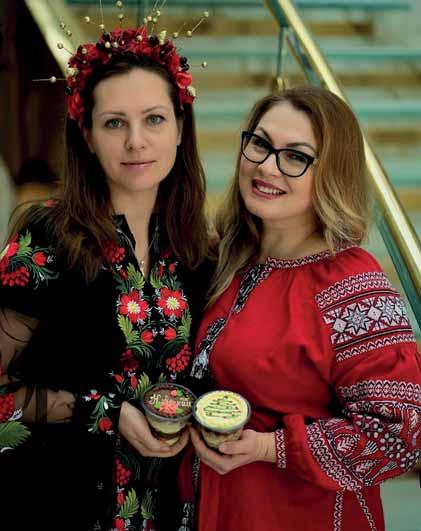
I remember as a young journalist, travelling to interview the then president Leonid Kuchma, I was happy to receive the multicolored, nutty meringue cake with its must-have ornament Kyivskyi written on it in Ukrainian in a plain white box, and a Petrykivka technique vase. So, when I heard about the cake ladies Aliona Ostapchuk and Natalia Rukavchuk, I knew I wanted to introduce them to our community.
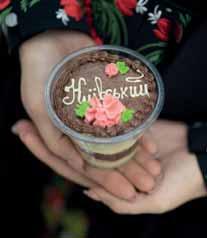

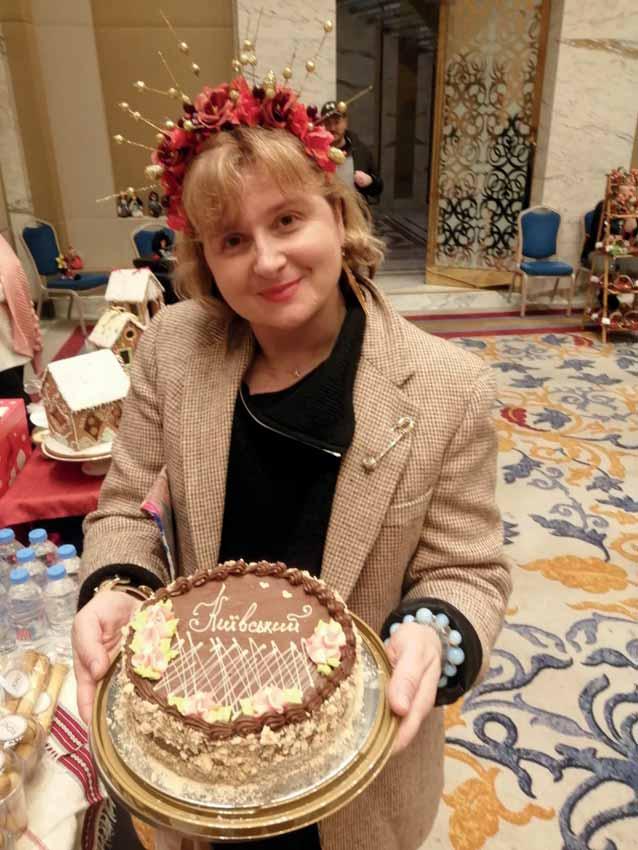
‘’The business started in just four days,” Natalia said, who is from Nikolayev and came to Georgia with her mother, who is helping her. ‘’I made the famous Medok (honey cake) for a friend who had asked for it online. I made it, but my best is Kyivskyi.’’
The cake ladies united their knowledge, set goals, found the ideal premises and put the bakery together. Since then,
orders have been flying out from all sides. The dessert cake was originally made on December 6, 1956, by the Karl Marx Confectionery Factory. It does have secret ingredients Aliona tells us: 82% Ukrainian butter is one of them, though it does have a touch of Georgia, the local hazelnuts. Originally, cashews were favored, but the recipe returned to using hazelnuts to lower the costs; crushed hazelnut mixed with egg layers is layered, covered with cream first and then chocolate buttercream and decorated with floral ornaments and writing. This is easier said than done, but the ladies do wonders.
Pushing production up to even 50 a day at its peak, this quick decision has become a very serious business, and now they bake outside orders coming from cafes and restaurants; this in addition to individual orders! Several cafes even order the cake in single portions, which are ideal for the coffee break, the exact cup-sized cakes I witnessed them making during the interview as we spoke.
“We have a responsibility towards our friends and loved ones who financially helped us to start this venture. We also want to expand to higher levels; there is clearly a demand from clients in all circles of society, even the Russians!’’
Today, Ukrainian refugees found themselves cooking and baking to handle both
GEORGIA TODAY FEBRUARY 3 9, 2023 10 SOCIETY
Where I’ve Never Been
HANMER
Being the title of a current solo exhibition (running until the 27th of February) of a new friend of mine, Nika Khabelashvili, 23 years old. At the Gamrekeli Modern Gallery (details below), curation by Natalia Nickatsadze. My wife and I and some other friends were among the many people present at its opening where, to the soundtrack of amazingly fitting and atmospheric music by Ketevan Giorgadze, we took in the 35 paintings, produced over two years.
Nika’s work here in his 4th solo show is almost all in acrylic on canvas, and ranges in size from 20 or 30 cm in length to about 2 m. The paintings are all untitled, but are part, as he explains it, of one piece of art, working together.
There are landscapes and cityscapes, in daylight and at night; some with animals or people in them to give vast scales. Moody, dramatic, evoking powerful feel-


ings like the memories with which they are meant to be connected. When we remember a place, Nike says, that’s not the same as the place itself. We never feel the same about a memory as the “actual” event or place we are remembering. All of these paintings are connected with places Nika HAS been to, contrary to the exhibition’s title. But being there and remembering having been there are two very different things for him.
I am still in my art-buying phase, fulfilling my lifelong dream of living in a gallery of works by others and myself. I will not buy just anything, by anyone, for the sake of covering walls. No, every piece of art I frame or buy will be something to which I will return again and again, never tiring of it. I can say the same for the music I listen to and the things I read: they all bear multiple takings-in, even though I change over time in relation to the world and each piece. So it is with pleasure that I walk around the gallery and consider certain paintings.
I don’t, actually, automatically go for the one painting (on paper) which features Mt. Ushba in the background. Svaneti this might be, but other pieces nonetheless draw my eye more.
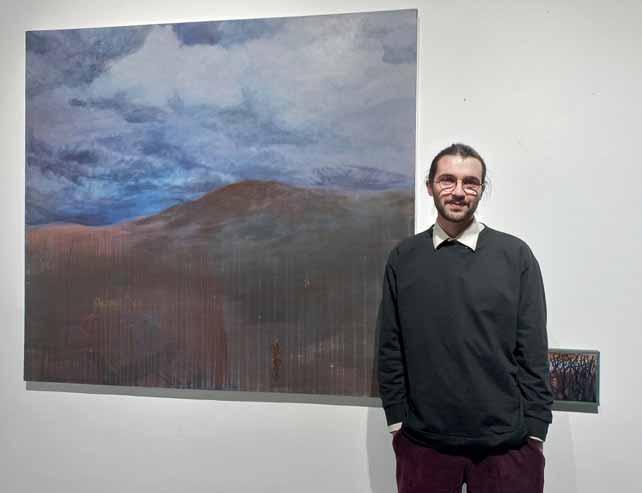
The largest ones are beyond my budgets of both money and space; but the smaller ones are all free of these constraints. Vacillating between two landscapes, I finally settle on one, check the price, and ask to buy it. This will be done by bank transfer to the gallery’s account, and I can collect my chosen painting once the show is over, at the end of February. My piece is just

a river winding and branching, crossing itself, most chaotically, almost smoke-like, though a featureless background of a single color (indeed, my wife thought it was smoke at first). I love it already, and this love will only grow over time. Very simple and stark, but not abstract: I can see what’s there, and will pick out the details as I continue to live with it.
Of course, it’s the unconscious dream of many a collector, myself included, to have bought early something which in
future will be worth a fortune. But for no main reason other than that I see so much talent here and that it resonates powerfully with my esthetic. I want to see this artist succeed.
DETAILS:
Gamrekeli Modern (Contemporary)
Open daily from 10 am to 6 pm 83 Ilia Chavchavadze Avenue, Tbilisi (go towards Tskneti, then double back and turn right, go up the hill to the end. It’s on the ground floor of an apartment complex; ask for the gallery if you have to) https://gamrekeli.com/ gamrekeligallery@gmail.com
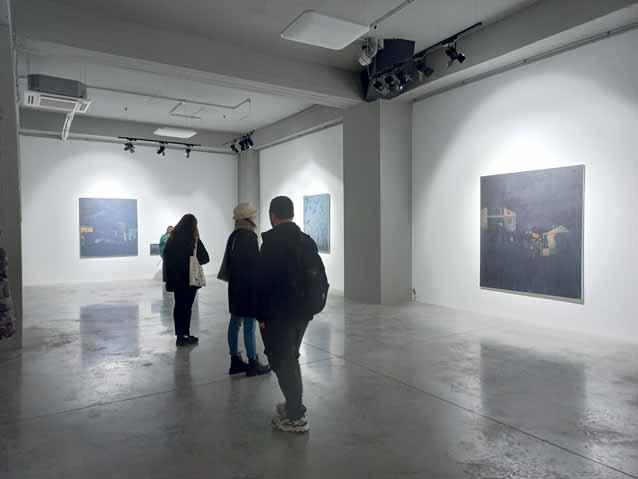
Tel. +995 322 995723
Tony Hanmer has lived in Georgia since 1999, in Svaneti since 2007, and been a weekly writer and photographer for GT since early 2011. He runs the “Svaneti Renaissance” Facebook group, now with nearly 2000 members, at www.facebook.com/ groups/SvanetiRenaissance/ He and his wife also run their own guest house in Etseri: www.facebook.com/hanmer.house.svaneti
PUBLISHER & GM
George Sharashidze
COMMERCIAL DEPARTMENT
Commercial Director: Iva Merabishvili
Marketing Manager: Natalia Chikvaidze
EDITORIAL DEPARTMENT:
Editor-In-Chief: Katie Ruth Davies
Journalists: Ana Dumbadze, Vazha Tavberidze, Tony Hanmer, Emil Avdaliani, Nugzar B. Ruhadze, Michael Godwin, Ketevan Skhirtladze, Mariam Mtivlishvili, Erekle Poladishvili
Photographer: Aleksei Serov
Website Manager/Editor: Katie Ruth Davies
Layout: Misha Mchedlishvili
Webmaster: Sergey Gevenov
Circulation Managers: David Kerdikashvili, David Djandjgava
ADDRESS 1 Melikishvili Str.
Tbilisi, 0179, Georgia
Tel.: +995 32 229 59 19
E: info@georgiatoday.ge
F: GeorgiaToday
ADVERTISING & SUBSCRIPTION
+995 555 00 14 46
E-mail: marketing@georgiatoday.ge
Reproducing material, photos and advertisements without prior editorial permission is strictly forbidden. The author is responsible for all material. Rights of authors are preserved. The newspaper is registered in Mtatsminda district court.
Reg. # 06/4-309
GEORGIA TODAY FEBRUARY 3 - 9, 2023 11 CULTURE GEORGIA TODAY
BLOG BY TONY







 BY MICHAEL GODWIN
BY MICHAEL GODWIN






















